Robin Helweg-Larsen's Blog, page 24
September 9, 2024
Joe Biden’s favourite poem: Seamus Heaney, ‘The Cure of Troy’

Human beings suffer
They torture one another,
They get hurt and get hard.
No poem or play or song
Can fully right a wrong
Inflicted and endured.
The innocent in gaols
Beat on their bars together.
A hunger-striker’s father
Stands in the graveyard dumb.
The police widow in veils
Faints at the funeral home.
History says, Don’t hope
On this side of the grave…
But then, once in a lifetime
The longed-for tidal wave
Of justice can rise up,
And hope and history rhyme.
So hope for a great sea-change
On the far side of revenge.
Believe that a further shore
Is reachable from here.
Believe in miracles
And cures and healing wells.
Call miracle self-healing:
The utter, self-revealing
Double-take of feeling.
If there’s fire on the mountain
Or lightning and storm
And a god speaks from the sky
That means someone is hearing
The outcry and the birth-cry
Of new life at its term.
It means once in a lifetime
That justice can rise up
And hope and history rhyme.
*****
US President Joe Biden frequently quotes poets: Yeats and, especially, Heaney; often with the disclaimer that he doesn’t quote Irish poets because of his Irish heritage, but because Ireland has the best poets. And from the poem above, the verse that particularly resonates with him is:
History says, Don’t hope
On this side of the grave…
But then, once in a lifetime
The longed-for tidal wave
Of justice can rise up,
And hope and history rhyme.
Joe Biden may not be perfect, but it is reassuring to have an American President with at least some commitment to Justice… and the sensibility of reinforcing it through the memorisation of poetry.
Photo: Joe Biden’s White House Facebook post for St. Patrick’s Day 2022.
September 7, 2024
Weekend read: David Galef, ‘A Question of Emphasis’ or ‘Wanna Make Something of It?’
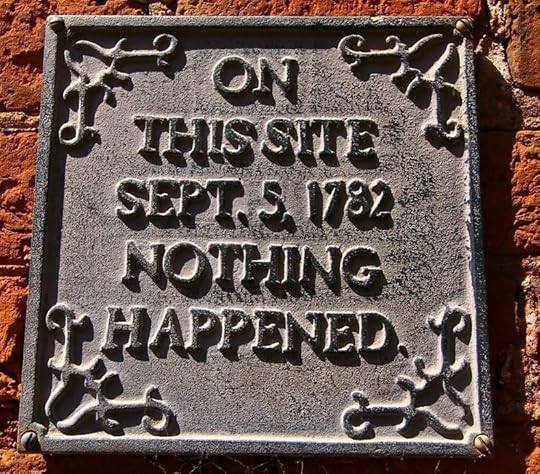
“poetry makes nothing happen . . . .”
—W. H. Auden, “In Memory of W. B. Yeats”
Poetry makes nothing happen.
Song lyrics, on the other hand,
Wedge into people’s hearts
When sung by a heartthrob band.
Poetry makes nothing happen.
It doesn’t enforce a cause.
That’s the way of propaganda,
With all its fixed applause.
Poetry makes nothing happen.
But I’ve seen something sublime
In the eyes of a student reading
Eliot’s Prufrock the first time.
Poetry makes nothing happen.
But must events take place
For poems to be eventful—
To make a normal pulse race?
*****
David Galef writes: “This poem was inspired by the memory of a graduate seminar taught by Edward Mendelson, a professor at Columbia University and the executor of the Auden estate. What Mendelson doesn’t know about Auden probably isn’t worth knowing, and what he brought to the study of Auden’s poetry was a deep knowledge of technique, context, and Auden’s modus cogitandi. Tired of those who quoted Auden’s famous line from “In Memory of W. B. Yeats” to indicate the inutility of poetry, Mendelson pointed out that the significance of “For poetry makes nothing happen” is more a point about art versus propaganda. The emphasis shouldn’t be on “nothing” but on “makes.” The aim of agitprop is to make all minds bend in one direction. True art, on the other hand, doesn’t force one meaning on the audience, though it may be powerfully suggestive. As Auden continues (and people who quote often omit surrounding words),
“it survives
In the valley of its making where executives
Would never want to tamper, flows on south
From ranches of isolation and the busy griefs,
Raw towns that we believe and die in; it survives,
A way of happening, a mouth.”
Poetry does indeed enjoy a special, immortal status, but those who want it to be a crowd-controlling megaphone will probably be disappointed.
What I wanted to accomplish in ‘A Question of Emphasis’ is just what stressing the right
word can do, and how poetry can change lives, in its own way.”
David Galef has published over two hundred poems in magazines ranging from Light and Measure to The Yale Review. He’s also published two poetry volumes, Flaws and Kanji Poems, as well as two chapbooks, Lists and Apocalypses. In real life, he directs the creative writing program at Montclair State University.
www.davidgalef.com
Editor: I can’t help adding this 6-minute exposition of emphasis from Hamlet: https://vk.com/video17165_456239062 with its star-studded cast… Enjoy!
Photo: “Nothing happened” by Graham Ó Síodhacháin is licensed under CC BY-SA 2.0.
September 6, 2024
Melissa Balmain, ‘No Ifs, Ands, Or Bots’
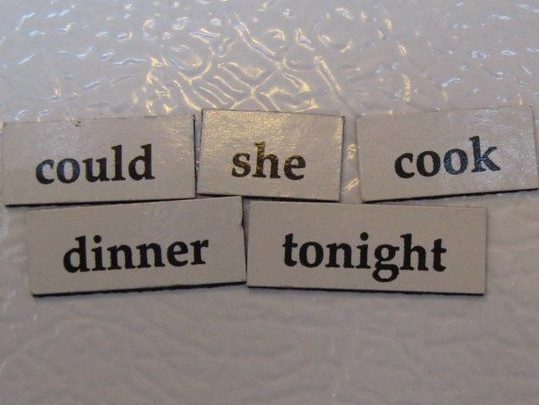
Tradwife? No, thanks. I’m not the type you’ll find
exclaiming “Yippee!” “Yesiree!” or “YOLO!”
at thoughts of chores I might be doing solo –
especially the old-school kitchen kind.
Churn butter? Grow a sill of herbs? You’re kidding.
Give me boxed broth and Hellman’s mayonnaise
and sourdough I didn’t have to raise.
Give me technology that does my bidding.
Yet how I love to cook up verse from scratch:
to handpick thoughts I planted as a kernel
within the fertile pages of a journal,
add rhymes (a meaty or a salty batch),
then whip them into something that – although it
may stink at times – tastes vastly fresher than
the glop inside an algorithmic can
because you know it comes from me, Tradpoet.
*****
This poem was the lead poem in the latest Lighten Up Online (“LUPO”). Melissa Balmain writes: “Ironically, in the weeks since I wrote this poem, a health condition has forced me to do a lot more tradwifely stuff in the kitchen–making low-acid salad dressing, say. But I still refuse to churn butter.”
Melissa Balmain’s third poetry collection, Satan Talks to His Therapist, is available from Paul Dry Books (and from all the usual retail empires). Balmain is the editor-in-chief of Light, America’s longest-running journal of light verse, and has been a member of the University of Rochester’s English Department since 2010. She is a recovering mime.
Photo: “could she cook” by aprilskiver is licensed under CC BY 2.0.
September 4, 2024
Short poem: RHL, ‘Flying to Majorca in March’

Drop me down out of the cold wet gloom
into the orange trees in bloom:
the olives, almonds, windmills, cypresses,
the black-eyed girls with wild tresses;
where once were barren hillsides, peasants, mules,
are now estates with swimming pools.
*****
Mallorca, or Majorca to the English, has always been an attractive destination for people from further north. Frederic Chopin and George Sand moved there at the beginning of their relationship, spending three months while Chopin completed his 23 preludes in each of the major and minor keys (but the locals were suspicious of his coughing, and were antagonised by George Sand’s avoidance of church; the couple moved on). Robert Graves (whose Wikipedia entry’s Sexuality section is mind-boggling) lived for decades in the village of Deia, also associated with Anais Nin, Richard Branson, Mick Jagger, Mark Knopfler, etc. And these days Mallorca gets over 10 million tourists a year.
My short poem is inconsequential, but it has just been published in the September issue of Allegro, which is themed on ‘Flight’. It was a simple reflection on revisiting Mallorca decades after summer holidays there.
Photo: “Parella i ase” by Arxiu del So i de la Imatge de Mallorca is licensed under CC BY-NC-ND 2.0.
September 2, 2024
Using form: Villanelle with a limp: Susan McLean, ‘Instructions for Climbing and Descending’

Good foot goes to heaven; bad foot goes to hell.
When every step torments and pain is chronic,
you can’t do as you did before you fell
and sprained your ankle. As the tendons swell,
don’t make things even worse. Learn this mnemonic:
good foot goes to heaven; bad foot goes to hell.
Take one step at a time. Do not rebel
or grumble that restrictions are moronic.
You can’t do as you did. Before you fell,
you bounded up the stairs like a gazelle,
but now your gait is nearly catatonic:
good foot goes to heaven; bad foot goes to hell.
You’ve always known it doesn’t help to dwell
on loss. You should let go, but (how ironic!)
you can’t. Do as you did before you fell,
but try to play it safe while getting well.
The best advice is simple, yet Miltonic:
good foot goes to heaven; bad foot goes to hell.
You can’t do as you did before. You fell.
*****
Susan McLean writes: “I love villanelles. I like them partly because they are songlike and partly because they present interesting challenges for rhyming and for varying the repeating lines, known as repetends. I thought at first that I had set myself an impossible task with my “-onic” rhymes, but they kept surprising me and leading me in new directions. I was not planning to refer to Milton when I started, for example, but when I stumbled on “Miltonic,” it fit perfectly with the metaphors in the first line. When I started, I also didn’t realize how many ways the second repetend could be varied while still making literal sense.
“The idea behind the poem came from real-life experiences. I had sprained my right ankle once, and after I wrote this poem, I broke it twice. However, the first line, which is literally the mnemonic device offered by a physical therapist as a reminder of which foot to step on when going up or down stairs, was one I heard secondhand. My partner John was told it by his therapist when he had a painful foot. The rest of the poem is in lines with five beats (iambic pentameter), but that line has six. I decided to use it, nevertheless, because the extra beat in that repetend slows the line down, mimicking the slow gait of the person with the sprain. It also makes the line itself seem to limp.
The poem was originally published in First Things and later appeared in my second poetry book, The Whetstone Misses the Knife.”
Photo: “How Many Times Do You Have to Fall Before You End Up Walking” by Thomas Hawk is licensed under CC BY-NC 2.0.
August 31, 2024
Weekend read: Michael R. Burch, ‘Modern Orpheus, or, William Blake’s Whistle’
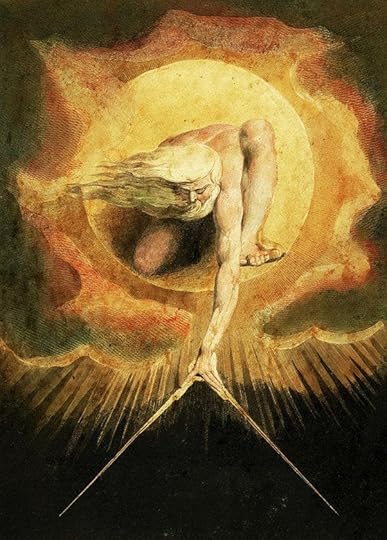
I.
Many a sun
and many a moon
I walked the earth
and whistled a tune.
I did not whistle
as I worked:
the whistle was my work.
I shirked
nothing I saw
and made a rhyme
to children at play
and hard time.
II.
Among the prisoners
I saw
the leaden manacles
of Law,
the heavy ball and chain,
the quirt.
And yet I whistled
at my work.
III.
Among the children’s
daisy faces
and in the women’s
frowsy laces,
I saw redemption,
and I smiled.
Satanic millers,
unbeguiled,
were swayed by neither girl,
nor child,
nor any God of Love.
Yet mild
I whistled at my work,
and Song
broke out,
ere long.
******
Michael R. Burch writes: “W. H. Auden famously (or infamously) said “poetry makes nothing happen.” I sympathize with his sentiment but beg to differ. William Blake has been a profound influence on modern culture and societies, not only through his own poetry, art and engravings, but also through his influence on singer-songwriters like Bob Dylan, John Lennon and Jim Morrison. When Dylan met the Beatles the first time, things were a bit cool at first, until Allen Ginsberg broke the ice by bringing up Blake. It turned out that everyone in the room was a fan. Morrison named his group the Doors after Blake’s ‘Doors of Perception’.
“William Blake has been a primary influence on my work, not only as a poet, but also as a translator, editor and publisher of poems about the Holocaust, the Palestinian Nakba, the Trail of Tears, and other similar instances of Blake’s three-headed hydra of church, state and industry doing its worst to make life on earth hell.
‘A Passing Observation about Thinking Outside the Box’ by Michael R. Burch
William Blake had no public, and yet he’s still read.
His critics are dead.
“William Blake was not an “art for the sake of art” adherent. Quite the contrary. Blake was an ardent reformer. For instance, he and Charles Dickens, who from what I understand lived on the same London street or nearby, wrote movingly about the plight of child chimneysweeps and other minors forced to work long, gruelling, sometimes dangerous, hours by unscrupulous businessmen, and before long England and other nations like the United States were passing child labor laws. Some poets do make things happen with their poetry…”
*****
Michael R. Burch is an American poet who lives in Nashville, Tennessee with his wife Beth, their son Jeremy, two outrageously spoiled puppies, and a talkative parakeet. Burch’s poems, translations, essays, articles, reviews, short stories, epigrams, quotes, puns, jokes and letters have appeared in hundreds of literary journals, newspapers and magazines. He is also the founder and editor-in-chief of The HyperTexts, a former columnist for the Nashville City Paper, and, according to Google’s rankings, a relevant online publisher of poems about the Holocaust, Hiroshima, the Trail of Tears and the Palestinian Nakba. Burch’s poetry has been taught in high schools and universities, translated into 19 languages, incorporated into three plays and two operas, set to music 61 times by 32 composers, from swamp blues to classical, and recited or otherwise employed in more than a hundred YouTube videos. To read the best poems of Mike Burch in his own opinion, with his comments, please click here: Michael R. Burch Best Poems.
Illustration: ‘Ancient of Days’ by William Blake
August 30, 2024
Sonnet: Sue Parman, ‘Kaizen: How to Build a Poem’
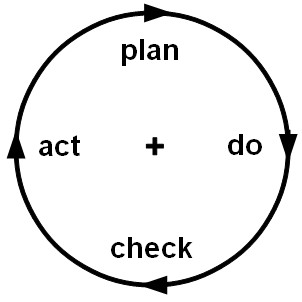
Ignore your hand and focus on the pen,
which writes without your knowledge of the whole.
Do not insert the personal. Avoid translation.
The changes made are small and gradual.
Commas herd their letters toward a distant
goal of rhymes and metaphors but do not
specify a conscious “I” or soul,
a bold new vision or a school of thought.
Write like a dancer making small mistakes.
What is wrong to you fulfills your friend’s desire.
Cuttings and shit are what it takes
to grow a garden from a funeral pyre.
A poet will die unless she learns to laugh.
Do not hit DELETE. Save everything as DRAFT.
*****
Sue Parman writes: “When I was four years old, my father asked me, ‘When is a door not a door?’ His answer, ‘when it’s ajar,’ infuriated and then intrigued me. I began to keep a journal in which I wrote down sentences such as, ‘If the Devil is evil, God is odd.’ Puns were my intro-duction to poetry, a form of verbal play that taught me that words, rather than being a lifeline to truth, could be slippery and contain many truths at the same time. One of my favorite poets is Kay Ryan, the queen of poetic puns (see her ‘Bestiary’). As an anthropologist, I consider them a vital contributor to mental health, since they satisfy the needs of large-brained mammals to avoid epilepsy by indulging in surprise.”
Sue Parman is an anthropologist and award-winning essayist, short story writer, poet, and playwright. She is the author of two poetry books, “The Thin Monster House” and “Carnivorous Gaze,” and her poems have been published in a variety of journals and anthologies, including the above poem in Rattle. She writes in a number of other genres as well, including anthropological travel memoirs and mysteries. Her most recent publications include a short story, “Gannets and Ghouls,” which appeared in the September/October 2024 issues of Ellery Queen Mystery Magazine; and a nonfiction essay, “You Can’t Get There from Here,” that was awarded the Travelers’ Tales Grand Prize for Best Travel Story of 2024. After teaching anthropology in California for thirty-five years, she moved to Oregon in search of water, and travels frequently in hopes of getting lost. https://www.sueparman.com
Photo: “PDCA-Cycle-Kaizen” by Tagimaguitar is licensed under CC BY-SA 3.0.
August 28, 2024
Short poem: RHL, ‘I Started Out Alone’
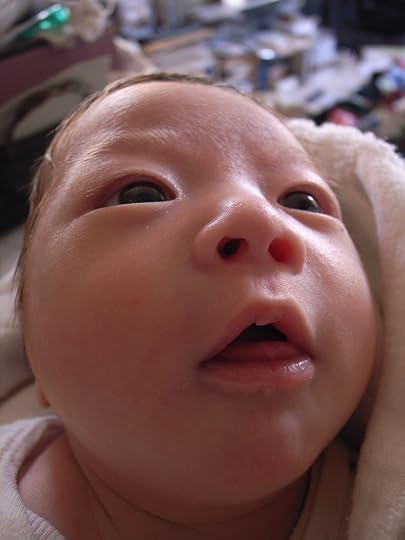
I started out alone,
No numbers and no words.
The people gave me food and clothes.
I loved the sun and birds.
And when I reach the end
Numbers and words all done,
Have to be fed and dressed again,
I’ll love the birds and sun.
*****
This is one of my favourite poems, for several reasons:
First, it extols the combination of curiosity, enjoyment and acceptance that I believe is appropriate for this thing called life.
Second, it is simple in expression: simple words, simple rhythm, in iambics with simple full and slant rhymes.
And third (and perhaps most importantly) it is easy to memorise: it has lodged itself in my brain without any effort or even intent on my part and, as this blog frequently claims, that is the essence of poetry.
‘I Started Out Alone’ was originally published in Bewildering Stories in 2019. More recently it was included in a batch of my poems that Michael R. Burch spotlighted in The Hypertexts for August 2024.
Photo: “Baby face” by matsuyuki is licensed under CC BY-SA 2.0.
August 26, 2024
Jawaharlal Nehru’s favourite poem: Robert Frost’s ‘Stopping by Woods on a Snowy Evening’
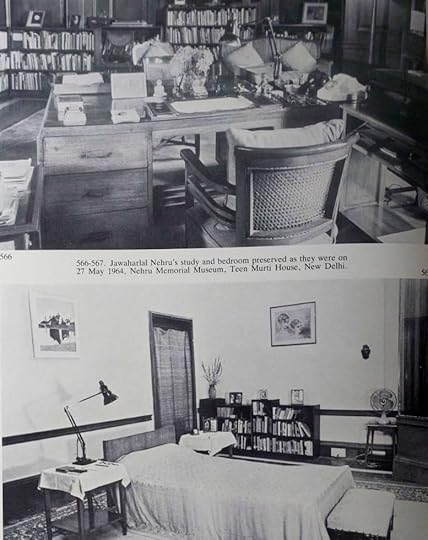
Whose woods these are I think I know.
His house is in the village though;
He will not see me stopping here
To watch his woods fill up with snow.
My little horse must think it queer
To stop without a farmhouse near
Between the woods and frozen lake
The darkest evening of the year.
He gives his harness bells a shake
To ask if there is some mistake.
The only other sound’s the sweep
Of easy wind and downy flake.
The woods are lovely, dark and deep,
But I have promises to keep,
And miles to go before I sleep,
And miles to go before I sleep.
*****
In June 2023 Indian Prime Minister Narendra Modi visited the United States, and President Joe Biden gave him an autographed first edition copy of the ‘Collected Poems of Robert Frost’. (Modi gave Biden a copy of the ‘Ten Principal Upanishads’ by Purohit Swami and William Butler Yeats – the latter being a poet that Biden frequently quotes.)
In India the gift of Frost’s work was recognised as a tribute to Jawaharlal Nehru, India’s first Prime Minister. Nehru, apart from being a founding father of Indian democracy, was a prodigious writer with a love of history, poetry and nature; in Himalayan vacations he went horseback riding and exploring woods. Frost’s poetry was a natural for him. Nehru had a particular fondness for ‘Stopping by Woods on a Snowy Evening’. Towards the end of his life he kept a copy of Frost’s poems by his bedside, with the last stanza of “Stopping by Woods” underlined:
The woods are lovely, dark and deep,
But I have promises to keep,
And miles to go before I sleep,
And miles to go before I sleep.
Photos: Jawaharlal Nehru’s study and bedroom, preserved as they were at the time of his death.
August 24, 2024
Weekend read: Tom Vaughan, ‘Rhyme-Crime’
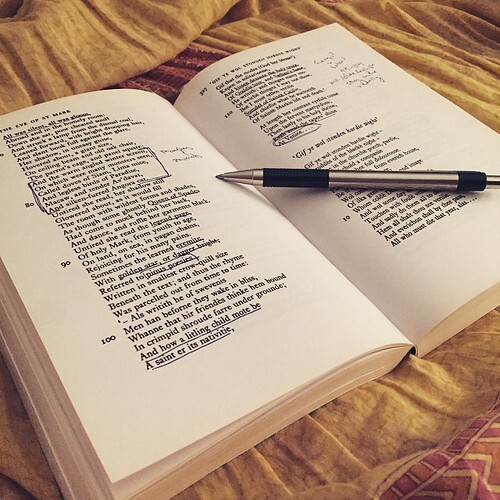
Does rhyme matter –
however occasional?
It used to be
considered vocational
a must for verse’s
inspirational
impact, even
educational –
but these days, it’s a
generational
sign your stuff’s just
recreational.
*****
Tom Vaughan writes: “For me, rhyme is not just a technical trick to help make poetry memorable. I think the world rhymes in odd ways. I also believe time rhymes, across the centuries but also in our short individual lives, sometimes in irony, but more often – if we listen hard enough to hear it – to point the way to a deeper level of challenge and reflection.”
Editor: I had been planning a rant on the essence of poetry being all the tricks that make it memorisable word-for-word: rhyme, rhythm, alliteration, assonance, etc; and on the fact that the bits of poems an adult remembers are invariably rhymed; and on poetry’s links to dance and song and the prenatal heartbeat. But Tom Vaughan introduces a whole new layer of value of rhyme, obliquely in his poem, incompletely in his comment. There are things to meditate on here.
Tom Vaughan is not the real name of a poet whose previous publications include a novel and three poetry pamphlets (A Sampler, 2010, and Envoy, 2013, both published by HappenStance; and Just a Minute, 2024, from Cyberwit). His poems have been published in a range of poetry magazines, including several of the Potcake Chapbooks and frequently in Snakeskin.
He currently lives in Brittany.
https://tomvaughan.website
Photo: “Sometimes, I like going back into #poetry and pretending like I am still in college. #johnkeats #bookstagram #annotations #reading #books” by alis.smith is licensed under CC BY-NC 2.0.



